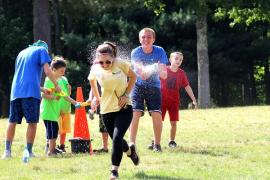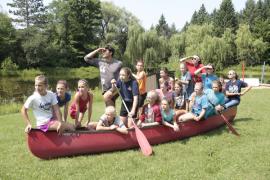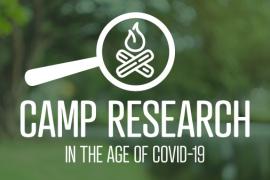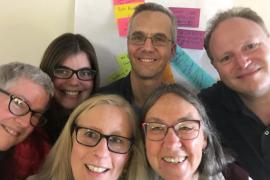It’s July, which means peak season, full-on camp mode, minute-to-minute decisions and pivots based on camper needs. We wanted to give you the opportunity to take five minutes to stop thinking about the overnight trip next week that you need to prepare for, the two-week heatwave, or a thousand other pressing needs and allow yourself the chance to breathe and reflect.
Why? Because we can all get so wrapped up in the day-in-day rhythms of our own camps and forget about our connections to the larger camp community. We can fill our cup and recharge by reminding ourselves of the ways that we as members of the larger camp community are learning, growing, and expanding. At the end of a two-year effort focused on program quality called the Program Quality Initiative, we wanted to share some of our lessons learned and things we are still grappling with in hopes some of this might resonate with you.
In this blog, we briefly summarize our recent learnings and identified gaps related to the Camp Program Quality Initiative, funded by the Lilly Endowment.
What We Learned (and Are Still Learning)
- How to explain program quality clearly to camps. Our go-to explanation: program quality represents how programs are implemented. A bit more wordy way to say this is that program quality refers to the ways camp staff practices, activities, and program climate foster youth development outcomes consistently over time. Quality is determined at the point of service, when campers interact with camp staff and their peers during structured and unstructured time. In a high-quality program, young people feel that these interactions are safe, inclusive, and they are involved in meaningful choices about their experience.
- Practical camp-friendly tools can help to promote program quality efforts. Program quality is a pretty abstract concept. It’s not so easy to conceptualize how this looks in camps. In partnership with the Weikart Center, we developed a Social and Emotional Learning Program Quality Assessment for Camp (SEL PQA for Camps) tool that allows camps to assess different aspects of their program, specifically (a) safe environment (e.g., creating safe spaces), (b) supportive environment (e.g., emotion coaching), (c) interactive environment (e.g., fostering learning), and (d) engaging environment (e.g., supporting youths interests) to make this feel more concrete. The tool measures campers’ access to key developmental experiences and produces scores that can be used to assess progress over time. We hope that the tool helps camps reflect on their strengths and areas for growth and can be used in an ongoing way.
- Incorporating continuous quality improvement into camp programs is exactly what it sounds like: continuous. We don’t view continuous quality improvement as a checklist, but as something that can improve year after year. Improving program quality should be a year-round commitment, and we have multiple points of engagement to support this all year long! During the spring, camp professionals can participate in trainings to learn how to use the SEL PQA for Camps tool and take workshops designed to help improve different aspects of programs (e.g., how to create safe spaces or foster teamwork within the programs). In the summertime, camps are able to conduct self-assessments using the SEL PQA for Camps tool and have a reliable, trained external assessor-coach visit and observe their programs. In the fall, we offer a Planning with Data workshop to help professionals read the data from their summertime assessments and create Program Improvement Plans for the next summer. Each year, camp programs can work to improve their quality.
- Focusing, addressing, and attending to diversity, equity, and inclusion in camp settings is so important, can be done in so many different ways, and takes time and patience. A group of camp professionals decided that one important first step on this journey would be developing a self-assessment tool that camps can use to assess aspects of DEI in their programs. A DEI Workgroup of camp professionals subsequently developed this tool over a 16-month period. The tool includes dimensions related to camper and community engagement, organizational culture, staff and leadership development, and the board of directors. If you are interested in using this tool, please email [email protected].
Where the Gaps Still Are
- We are building out the applicability and potential modifications of the Social and Emotional Learning Program Quality Assessment for Camp tool for different audiences in the summer camp setting. Our friends from the SeriousFun Children’s Network are working with the Weikart Center to create a version for medical specialty camps. We have also had lots of conversations about how this tool does (or does not) apply to overnight trip camp programs and outdoor education experiences.
- How to scale this work up to camps without staff dedicated to program quality efforts. In the current project, we worked with lots of camps that we might call “early adopters” in the field of implementation science. That means these camps were motivated, excited, and had capacity to engage in the project quality work. We found that the most progress was made at camps with at least 1 full-time, year-round (not seasonal) camp professional whose job responsibilities involved a focus on program quality. We are still figuring out how to have camps without a devoted staff take this type of work on. There might need to be a concerted ongoing commitment to program quality across 3-5 staff (none of whom have substantial time to devote to this) as well as foundational training in this topic area for all staff.
We learned a lot during the first two years of the Camp Program Quality Initiative. We have built systems to support camps in engaging in continuous quality improvement throughout the year and we would love for you to join us in the work! If you are interested, email [email protected] and visit our Camp Program Quality Initiative webpage to learn more!
Photo courtesy of Shutterstock
Allison Dymnicki, American Institutes for Research. Allison started as a camp counselor at Ramapo Anchorage Camp and now works at American Institutes for Research as a Principal Researcher, focusing on learning more about efforts and initiatives done in camp and other out-of-time settings. She aims to bridge research and practice and is excited to be involved with the different special projects going on at ACA.
Jessie Dickerson, MS, American Camp Association. Jessie is a Grants and Special Projects Manager with ACA’s Research and Education Team and manages the Camp Program Quality Initiative and the Leadership Pathways Project.
The views and opinions expressed by contributors are their own and do not necessarily reflect the views of the American Camp Association or ACA employees.




